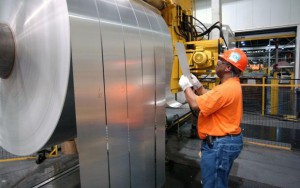 Following a recent request by the U.S. government into the competitive conditions of the aluminum industry domestically and in major producing and exporting countries, The House Committee on Ways & Means requested a formal investigation by the U.S. International Trade Commission (USITC) into the global competitiveness of the U.S. aluminum industry. The investigation will examine factors impacting the U.S. aluminum industry, such as excess capacity and trade practices that undercut the ability of U.S. producers to compete fairly in the global market.
Following a recent request by the U.S. government into the competitive conditions of the aluminum industry domestically and in major producing and exporting countries, The House Committee on Ways & Means requested a formal investigation by the U.S. International Trade Commission (USITC) into the global competitiveness of the U.S. aluminum industry. The investigation will examine factors impacting the U.S. aluminum industry, such as excess capacity and trade practices that undercut the ability of U.S. producers to compete fairly in the global market.
“An investigation by the USITC will help us address ongoing issues in the global aluminum industry that are hurting the domestic market and leading to curtailments, closures and job losses,” said Heidi Brock, President & CEO of the Aluminum Association. “I am pleased that the Congress recognizes the continued economic importance of this vital industry and I applaud Chairman Brady’s leadership to move this issue forward. We also are grateful for the continued support of the Congressional Aluminum Caucus, which was instrumental in advancing this initiative.”
The U.S. aluminum industry is of vital strategic and economic importance with manufacturing facilities in almost all U.S. states; it supports nearly 678,000 direct, indirect and induced jobs; and generates $154 billion in economic output – nearly 1 percent of U.S. gross domestic product. Since the beginning of 2015, nine U.S.-based aluminum smelters have curtailed or closed, representing 65 percent of U.S. primary aluminum capacity and impacting more than 3,700 workers. “There are positive developments happening in the U.S. aluminum industry today – from record-setting demand growth in the transportation sector, to innovations in recycling and sustainability,” said Garney Scott, President & CEO of Scepter, Inc. and Chairman of the Aluminum Association. “But, we can only continue on this path if we are operating on a level global playing field.”
The investigation falls under Section 332 of the Tariff Act of 1930, which allows the President, Congress, or the U.S. Trade Representative to request fact-finding investigations on any matter involving tariffs or international trade. While the USITC makes no policy recommendations in its reports, so-called “332 investigations” can inform policymakers about government programs and trade practices in other countries that warrant attention. USITC reports are routinely referenced or cited in future trade negotiations, by Congress in formulating trade policy and by industries advocating policy changes or seeking adjudication of trade disputes.



